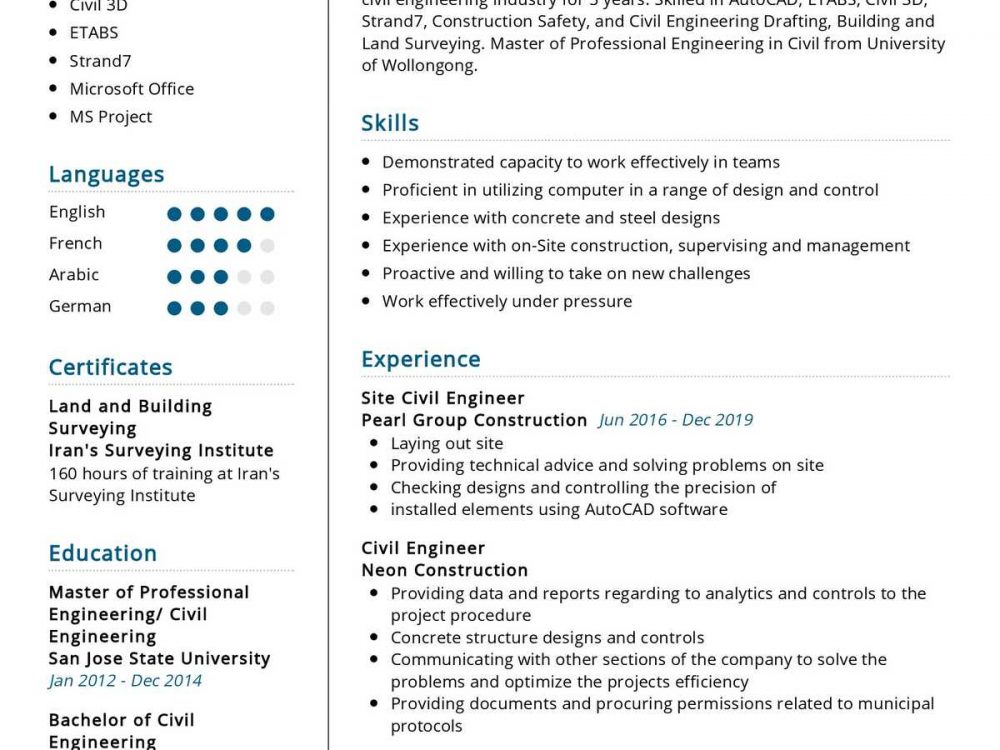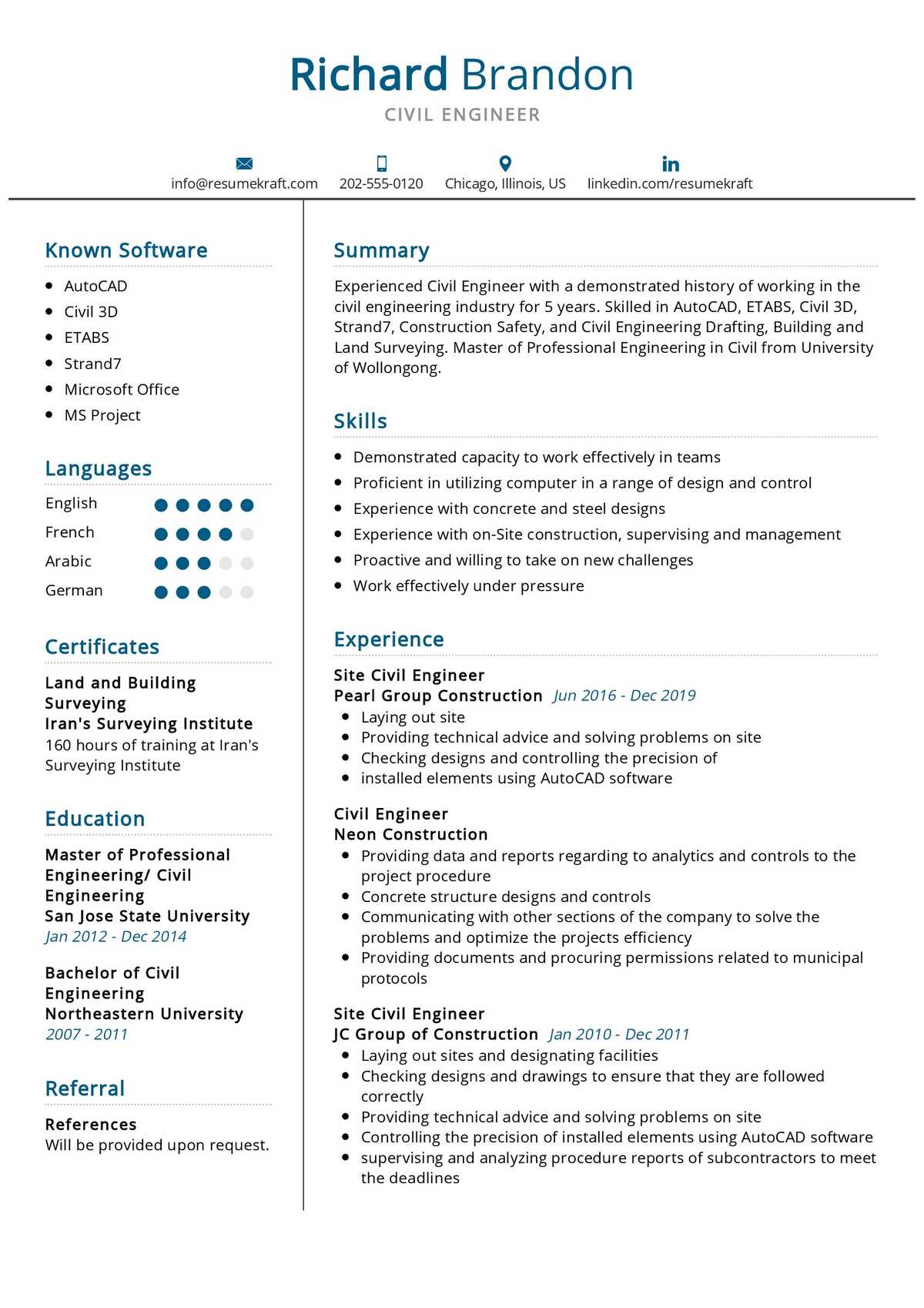Guide and Tips to Write a Civil Engineer Resume
The Civil Engineer resume is a crucial step in your job search. It’s the first impression you give to potential employers, and it’s what will get you that coveted interview. Writing a resume can be challenging, though, especially if you’re not sure what information to include or how to present it in order to get the job you want. Use this guide to learn how to write a resume for your career as a Civil Engineer, and perhaps even land an interview!
What is a Civil Engineer?
A Civil Engineer is a licensed professional who applies scientific principles to the planning, construction, and maintenance of large-scale structures like bridges and roads. Though there are many different types of Civil Engineers who specialize in different areas of expertise, all Civil Engineers have learned the basics of structural, environmental or geotechnical engineering.
What are some key Skills of a Civil Engineer?
A Civil Engineer should have knowledge of many different skills and concepts. Since you will be responsible for designing, planning, and constructing a variety of structures, it’s important that you have expertise in each area.
Technical Skills – Depending on what type of Civil Engineer you are, your technical skills may vary. For example, structural engineers are often concerned with mechanical and electrical systems. Environmental engineers may focus more on pollution control or the environment. Geotechnical engineers are in charge of designing materials that can support buildings and highways.
Problem Solving Skills – Understanding the basics of engineering is great, but if you’re going to be a good Civil Engineer you’ll need to know how to solve problems. It will be your job to design, develop and oversee projects that affect millions of people. You’ll have to have a background in maths, physics, and chemistry – among other subjects – in order to get the job done effectively.
Communication Skills – To get your ideas communicated effectively, you must know how to articulate them clearly and concisely. A Civil Engineer knows how to effectively communicate with a wide range of people in order to gather information, develop and deliver a well-thought plan, and implement it successfully on the job.
Teamwork Skills – Employees of a Civil Engineer job will need to work on projects as a team in order to get them completed. Communication is key here. This means that you’ll have to share knowledge and ideas with your colleagues as well as keep them updated if there are any problems or delays in the project.
Tips to write a Civil Engineer Resume:
There are many different ways to write a resume. You can use a cookie-cutter resume format, which is based on the popular chronological and functional formats, or you can build your own unique layout to get your points across in an interesting way. No matter which format you choose, here are some tips on how you can write the perfect Civil Engineer resume:
Keep it short and sweet – A good resume should be no more than two pages long. The hiring manager may not read anything beyond that if they see it is too long.
Start with a summary of qualifications – You can use the summary section to sum up your skills, experience and education for the employer.
Highlight your key strengths and accomplishments – Make sure to include examples of awards, recognition, or promotions you’ve received to show that you’re a strong candidate.
Make sure your resume has an effective layout – Your resume should flow from top to bottom in a very logical way, starting with your contact information, professional experience and education.
Add keywords – Including appropriate keywords in your resume can help you to get noticed by ATS (Applicant Tracking Systems) programs which scan resumes and rank them based on which candidates have the skills that are most closely related to what they’re looking for.
Keep it professional – Avoid using slang or informal terms and instead use proper, professional terminology. Keep your writing style simple and straightforward.
Start out by choosing an appropriate format and layout for your Civil Engineer Resume.
Once you’ve decided on a format, make sure that you take your time to design a resume that will get you noticed. You don’t want to present any information on the wrong page, nor do you want any of it to be cut off when it’s printed or handed in.
When you’re ready, sit back and review your resume and check for spelling, punctuation and grammar errors. Once those are fixed go back through it again to make sure everything is still in order.
Once you’ve gone through the process a few times it will become easier and easier to get your resume perfect. Here are some other tips to make sure you have your resume in tip-top shape:
Final Tips – If you still need any help, here are some final things to remember:
Check the spelling of all words as this will help potential employers know that you actually read the job posting and understand what they’re looking for.
Be consistent. Translate the same approach into making your cover letters and writing your resume. For example, if you describe yourself as hard-working in your resume make sure to use that same adjective when describing yourself when you send a cover letter or response to a job posting.
Use the correct format for the type of position for which you are applying. Resumes for construction jobs, for example, should have more technical information. It’s also important that they are no longer than two pages long. Resumes for office jobs should be more formal and structured.
Tips to write a Civil Engineer Cover Letter:
Start with a brief summary of why you are contacting the employer. The summary should include your contact information, your key professional and educational achievements as well as why you think you are the right candidate for the position.
The best way to get noticed is to include keywords in your cover letter that relate to the position for which you are applying. For example, if you’re applying for a construction job, you can mention keywords like: “construction”, “site supervisor”, “supervisor”, “project management” and so on.
Once you’ve included the keywords, be sure to use them throughout your cover letter. For example, don’t just say that you’re hard-working and then stop there. Make sure to include more information about how you would be a good fit for the position, and why you believe your skills are a good match for this particular job.
You should also include additional keywords in your cover letter that relate directly to the position for which you are applying.
Conclusion:
I hope the above resume writing guide will help you end up with a resume that is perfect for you. Remember, nobody is perfect but the best thing you can do is practice and keep trying until you get it right.
Keep in mind that depending on your background, experience, education, and skills, there are many different types of resumes to choose from such as chronological resume, functional resume, objective resume, targeted resume. You should consider the job for which you are applying and the position that’s being offered.


